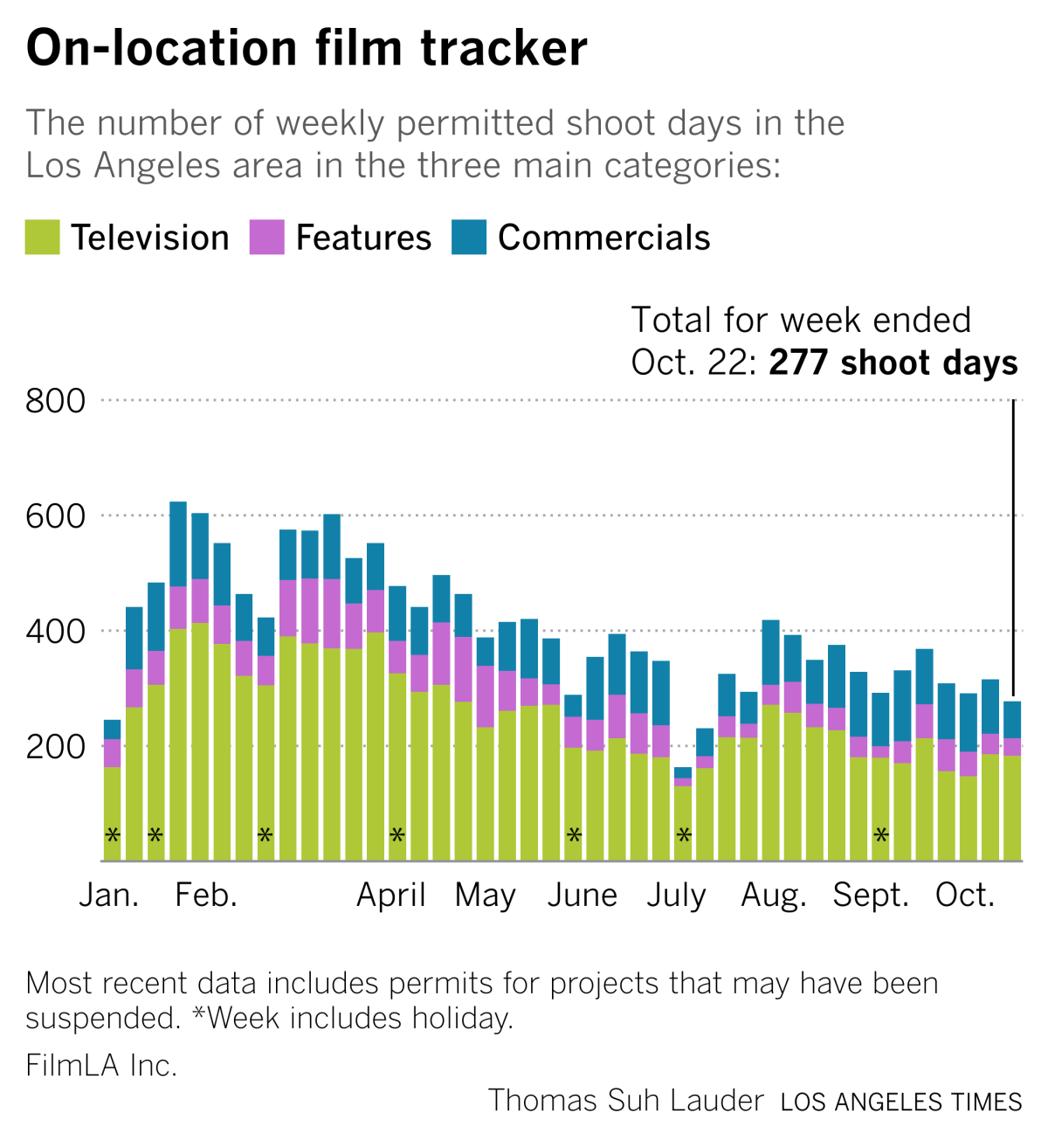SAG-AFTRA talks start again. Here are the stakes as the window to do a deal closes

- Share via
Welcome to the Wide Shot, a newsletter about the business of entertainment. Sign up here to get it in your inbox.
Let’s try this one again, shall we?
Performers union SAG-AFTRA and the alliance representing the major studios return to the bargaining table today for the first time since Oct. 11, when the entertainment companies suspended discussions for a new film and TV contract out of frustration over the still-gaping divide between the two sides.
As my colleagues Meg James and Wendy Lee reported, this represents perhaps the biggest test yet of SAG-AFTRA’s leaders — president Fran Drescher and chief negotiator Duncan Crabtree-Ireland — and the resolve of its 160,000-person membership.
All stakeholders are in a tough spot after more than 100-days of picketing.
Actors and crew members have gone months without working. Savings accounts are running dry. A group of A-listers, including George Clooney, Ben Affleck and Scarlett Johansson, recently approached guild leaders to find a way to end the work stoppage, proposing to eliminate the current $1-million cap on SAG-AFTRA membership dues to raise funds for struggling actors. The union leaders turned that down, because, in short, members’ dues don’t really have anything to do with the contract they’re trying to negotiate.
Studios, if they can’t get a deal done in the next couple weeks, will pretty much lose any hope of salvaging a scripted 2023-2024 television season. Mid-November is about when Hollywood typically starts to shut down for the year, anyway, which means the window is closing fast.
The studios’ upcoming movies, which they can’t rely on stars to promote right now, will suffer at the box office as Hollywood undergoes an unwanted experiment to see just how important it is, for example, to have Timothee Chalamet hitting press junkets and late night talk shows to promote “Wonka” (still on Warner Bros.’s theatrical release calendar for Dec. 15). It’s safe to say that movies such as Universal’s “Strays” and Sony’s “Gran Turismo” would’ve done better with fully operational, cast-fronted marketing campaigns.
Paramount Pictures on Monday delayed the debut of its next “Mission: Impossible” movie from June of next year to May 2025, due to the halt of shooting.
As was the case during the height of tensions amid the WGA strike, there are some who wonder if SAG-AFTRA’s leadership has backed itself into a corner. As the cliche of negotiation strategy goes, you ask for the stars to get the moon. The writers came out of their 148-day dispute feeling as if they’d won a full constellation of concessions. How will the actors, with all they’ve been promised, react if SAG-AFTRA resolves its negotiations by getting anything less than the Milky Way?
The key issue, the one that derailed the last round of talks, is how actors ought to share in the spoils of streaming, still an oxymoronic phrase for most companies.
SAG-AFTRA’s initial demand for 2% of total streaming revenue was a non-starter for the studios, so the actors instead asked for what amounted to roughly 57 cents a year for every streaming subscriber worldwide. There’s some dispute over what the cost of such a proposal would be for the studios, whether it’s $500 million a year or, as company sources say, more than $800 million. Either way, it’s a lot of money. Executives dread such a deal, dismissed by Netflix co-Chief Executive Ted Sarandos as a “levy,” eating into profits.
The studios hoped that the actors might accept something akin to what the WGA achieved — a payment system to reward people for high-performing series and movies. But there are already some worries on the actors’ side that threshold for the writers’ hard-fought-for viewership based bonuses — earned by shows and films that are watched by 20% of a service’s domestic subscribers in the first 90 days of release — set a high bar for success. (The WGA, for its part, considers the bonus system to be a significant victory.)
SAG-AFTRA is looking for a serious win here, as well as on other important deal points. Drescher, whose combative rhetoric galvanized the entertainment industry’s workforce and poured lighter fluid on nation’s hot labor summer, told my colleagues that the industry’s move to streaming had created an “economic dystopia” in which workers and actors “cannot make a living anymore.”
“My members need something significant in terms of compensation specifically in streaming video-on-demand,” she said. “I will not cave and I will not let them down, no matter what vitriol or intimidation tactics the companies choose to throw at me.”
As the haggling restarts behind closed doors, the big question is what the industry will look like when the studio productions are up and running again.
Box office sales are still well behind pre-pandemic levels and may never get back to the heights of 2018 and 2019, despite the optimism that followed the “Barbenheimer” phenomenon and Taylor Swift’s Eras Tour concert movie, the latter of which doesn’t benefit the studios anyway (the Swift clan did their film distribution deal directly with cinema chain AMC Theatres, taking a substantial share of a receipts).
Television and streaming don’t look a whole lot more promising, as the linear pay-TV industry faces long-term declines. An analysis by TD Cowen found that profit margins for legacy media companies’ “content aggregation businesses” — meaning traditional TV networks and streaming — have declined from 31% in 2013 to 16% last year, despite some deep merger-driven cost-cutting and layoffs.
The studios will say that’s why they can’t cave to the actors and set equally high expectations for crew when IATSE’s basic agreement comes up for negotiation next year. From the unions’ point of view, it’s exactly why they can’t give up now.
Stuff we wrote
Maha Dakhil, a top agent at CAA, steps aside from leadership roles after Israel-Hamas post. Dakhil resigned from the agency’s internal board and is stepping away from her position as co-head of the motion picture department after she reposted an Instagram Story from an account labeled Free Palestine, which read, in part, “You’re currently learning who supports genocide.” Dakhil will continue to represent clients, including Tom Cruise, Natalie Portman and Ava DuVernay.
AI is causing panic for authors. Now the courts are involved. High-profile authors such as Douglas Preston, George R.R. Martin and Michael Connelly are suing tech companies, saying that generative artificial intelligence software is ripping off their copyrighted work. But the legal issues may be complicated.
Fake court records. Forged signatures. Head of celebrity-fronted travel company confronts fraud claims. A convicted felon started an LGTBQ+ travel company with a “Mean Girls” star and an “Amazing Race” runner-up. Now he faces questions about his past.
‘Rust’ prosecutors consider charging Alec Baldwin again in fatal shooting. Prosecutors have taken steps toward refiling charges against Baldwin in the deadly accidental shooting of cinematographer Halyna Hutchins on a New Mexico movie set. A grand jury will be convened to determine whether to recharge Baldwin with involuntary manslaughter.
Half of Bandcamp’s 120-person staff laid off following second sale in 18 months. The beloved indie music distributor and community hub lost half of its employees today, following an acquisition by music licensing company Songtradr.
Number of the week

In streaming, Wall Street cares about profits more than it used to, but investors still like to see strong subscriber growth numbers.
Netflix delivered, adding 8.76 million members during the third quarter, which was quite a bit more than analysts had forecast. Some of that growth was “organic,” despite the lack of production during the work stoppages, attributed to a solid slate of shows like “One Piece,” buttressed by licensed oldies including “Suits.” But some of it was definitely because of Netflix’s ongoing campaign to get freeloaders — I mean “borrowers” — to pay up.
Netflix still isn’t saying exactly how many people are signing up for its advertising-supported tier, but indicated that ad-based subscriptions increased 70% from the prior quarter. About 30% of new signups are opting for the version with commercials in the countries where Netflix has launched its advertising business. Profit — what analysts are really focused on — topped expectations, and the company raised its full year free cash flow estimate to $6.5 billion from roughly $5 billion (thank you, Hollywood strikes). The stock surged.
All this seems to suggest that, while legacy media companies struggle with the transition from traditional businesses like pay TV to streaming, Netflix is pulling ahead of the pack. Direct to consumer businesses of Disney, NBCUniversal and others are still losing money. Netflix isn’t, and doesn’t have to worry about managing a fleet of declining cable channels.
Netflix, like other streaming services, is still raising prices. The “basic” tier, recently canceled for new and returning customers, will now cost $11.99 a month, up from $9.99. The premium tier is going up to $22.99 from $19.99. The costs of the ad-based and standard versions remain $6.99 and $15.49 a month, respectively.
Film shoots
Production numbers: still bad.

Best of the web
— Jon Stewart’s Apple talk show is done. The comedian “told members of his staff on Thursday that potential show topics related to China and artificial intelligence were causing concern among Apple executives,” according to the New York Times.
— The genius behind Hollywood’s most indelible sets. How Jack Fisk, the master production designer behind ‘Killers of the Flower Moon’ and many other films, brings the past to life. (NYT)
— Meredith Blake writes: ‘Titanic’ made Leonardo DiCaprio a Hollywood heartthrob. He’s been avoiding it ever since. 25 years after becoming king of the world, Leonardo DiCaprio is less Hollywood’s biggest movie star than its best-paid character actor. What happened to Leomania?
Finally ...
This Times interview with pop music icon Cher, 77, is a real treat, particularly for the casual missives on Madonna and California’s governor, on top of her thoughts on love and aging. Here’s a sample exchange:
Did you see that Madonna has a video clip in her new show from an old interview of yours where you said that she’s mean?
I said a lot worse than that.
What’s your beef with Madonna?
It’s not a beef. I actually like her. But come on.
Come on?
Come on.
What a legend.
The Wide Shot is going to Sundance!
We’re sending daily dispatches from Park City throughout the festival’s first weekend. Sign up here for all things Sundance, plus a regular diet of news, analysis and insights on the business of Hollywood, from streaming wars to production.
You may occasionally receive promotional content from the Los Angeles Times.




